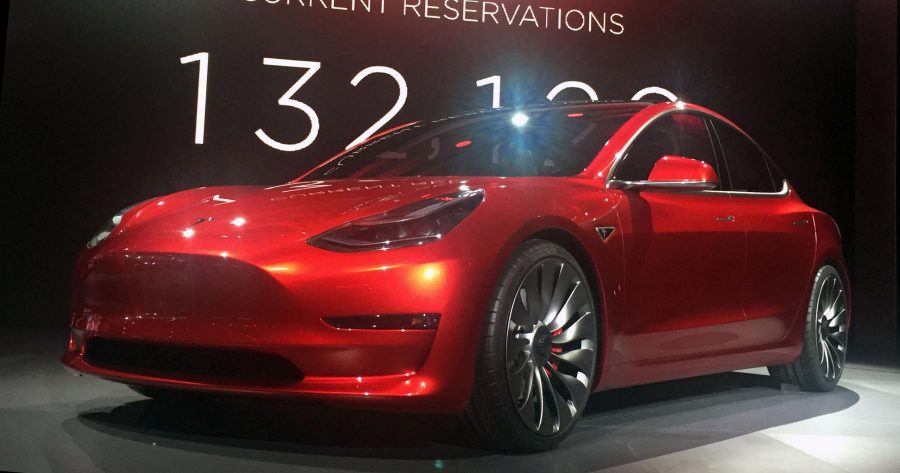The week where electric cars went mainstream
With premium electric cars finally becoming affordable, it is time to make the transition from gas to electric
photo via wikipedia.org under Creative Commons license
The Tesla Model 3 at the unveiling in Southern California on March 31, 2016.
325,000 reservations for a car that does not start production for 18 months is completely unheard of, especially when the car is fully electric.
On April 1, Tesla unveiled the Model 3, its first affordable model starting at about $35,000. With no advertising or endorsements whatsoever through Tesla itself, the model was able to lure in 325,000 prospective buyers in the first week of its release, making this the single biggest one-week launch of any product ever in history. These 325,000 reservations of $1,000 each add up to about $14 billion worth of sales when all is said and done.
After breaking records with the amount of reservations made, Tesla announced, very confidently, that was “the week where electric cars went mainstream” all thanks to the Model 3.
Sustainable transportation has been the prioritized goal of Tesla and the drive behind the electric vehicles they produce. Tesla’s first two models that put it on the map, Model S and Model X, start at about $70,000 and $80,000 respectively and go upwards to $150,000. A car at this price point is difficult to become mainstreamed and chosen over gasoline engine vehicles since the majority of Americans cannot comfortably afford such vehicles. The launch of the Model 3 absolutely changes that.
With the Model 3 only starting at about $35,000 before tax incentives and gasoline savings, which usually come out to about $17,000 (making the cost after savings only $18,000!), a wider audience can purchase the vehicle and help move the world into a sustainable one when it comes to transportation.
Oil, being a non-renewable resource, needs to be used scarcely when thinking about the future, even if is just a couple hundred years from now. According to the U.S. Department of Transportation, Americans drive, on average, about 13,476 miles annually. The University of Michigan Transportation Research Institute announced that cars consume an average of 1 gallon of gasoline for every 25.2 miles driven. There are about 900 million cars that get produced and purchased annually. According to these calculations, 481.3 billion gallons of gasoline will be consumed by vehicles only produced in 2016 in these next 12 months alone.
Not only does this pollute the environment, but it deplenishes a non-renewable resource that will not be around forever. It is vital to start making electric cars mainstream now, rather than later, so by the time gasoline presents itself as a formidable issue, the world has an alternative plan already in motion.
Tesla can start the “making electric cars mainstream” process, but it certainly cannot be the only one doing. Tesla founder Elon Musk has given permission to all other car manufacturers to use designs of his patented drive units and battery packs in hopes that they will steal the ideas from him and integrate it into the design of their very own electric vehicles. This means that Musk has vowed not to file lawsuits against any competitors that use this patented inventions for their own use. All of this is in an attempt to accelerate sustainable transportation.
With the cost of using home electricity to charge your vehicle being more cost-efficient than paying to fill up at a gas station and knowing that electric-powered vehicle is more beneficial to the environment than gas-powered vehicles are, it is an obvious mission every future car buyer should commit to, not only for the environment’s sake but their very own.
Argeen Ghazarian work for the Burbank Tesla Service Center.

INTERESTS/HOBBIES: Running, swimming, watching movies.
EXTRACURRICULAR ACTIVITIES: Volunteering and working.
THREE WORDS TO DESCRIBE ME ARE: Awesome,...











